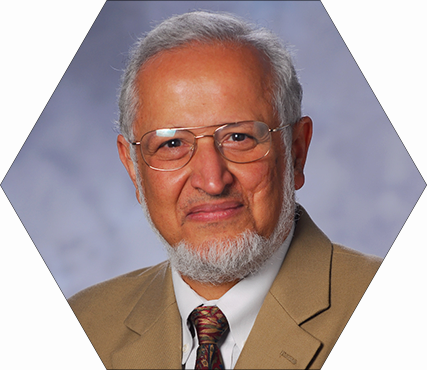Education
- Ph.D., University of California, Berkeley, 1974
- M.S., University of California, Berkeley, 1970
- B. Tech., Indian Institute of Technology, Kharagpur, India, 1967
Background
Dr. Mistree's design experience spans mechanical, aeronautical, structural, and industrial engineering. His teaching experience covers courses in engineering design, naval architecture, solid mechanics, operations research, and computer science. He has published two books and more than two hundred technical papers. He is interested in developing the means to enhance the ability of human designers to make decisions in the early stages of any product realization process. He began at Tech in Fall 1992 as a Professor. Prior, he was an Associate Professor and a Professor at the University of Houston. He retired from Georgia Tech July 2009.
Research
- Computer-Aided Engineering and Design and Mechanics of Materials; Strategic design, design of product families, and distributed design and manufacture
Dr. Mistree is developing the means to create the specifications for a system in the early stages of the product realization process, particularly how to manage design freedom associated with the design, deployment, operation, and support of open and sustainable engineering systems. His research activities are directed toward the development of underlying principles, computerbased methods, and tools for designing, producing, deploying, maintaining, and retiring engineering systems.
He was the founding Director of the Systems Realization Laboratory, which has as its objective the advancement of industrial capability for sustained development in a globally competitive marketplace by addressing such issues as developing the expertise and technology to realize a family of systems which satisfy the changing needs of customers in a global marketplace; reducing time-to-market and cumulative resource expenditures for the realization of a family of systems; and increasing quality through a customer sensitive, holistic, and integrated approach to system realization and marketing.
His research includes a number of investigations on enterprise integration: Integrated product and process development for global enterprise integration, which is sponsored by the National Science Foundation and Sandia National Laboratories; a simulation-based, ranged set of specifications for aircraft and automobile engines, sponsored by the National Science Foundation, Allison Engine Company/Rolls-Royce Plc, and Ford Motor Company; the design of product families; available assets-based mass customization, sponsored by the National Science Foundation, the National Aeronautics and Space Administration, Lutron Electronics, and Lucent Technologies; and the design-learning studio, a virtual environment for learning how to design, sponsored by the National Science Foundation, Georgia Tech Research Institute, and the EduTech Institute.
- Keynote Lecturer at the University of Zagreb’s 90th Anniversary Celebration of Continuous Education of mechanical engineers and naval architects, 2009
- American Institute of Aeronautics and Astronautics
- Multidisciplinary Analysis and Optimization Symposium General Co-Chair (with Dan Schrage), 2002
- Associate Fellow, 1999
- American Society of Mechanical Engineers
- Design Automation (Design Engineering Division) Award, 1991
- Design Engineering Technical Conferences General Co-Chair (with Harvey Lipkin), 1998
- Honors and Awards (Design Engineering Division) Chair, 1994-2003
- Design Theory and Methodology Conference Chair, 1994
- Fellow, 1994
- Jack M. Zeigler (BME 1948) Woodruff School Outstanding Educator Award, 2001
- Engineering Foundation Sponsored Optimization in Industry Conference Co-Chair, 1999
- Pi Tau Sigma (honor society) National Secretary-Treasurer, 1996-2007
Publications
- M. G. Fernndez, et al. 2005. Decision Support in Concurrent Engineering: The Utility-Based Selection Decision Support Problem. Concurrent Engineering Research and Applications 13(1), 13-28.
- C. C. Seepersad, et al. 2005. The Validation Square: How Does One Verify and Validate Design Methods? In Decision-Based Design, W. Chen, K. Lewis, and L. Schmidt, Eds.). ASME Press, New York.
- C. C. Seepersad, et al. 2004. Design of Multifunctional Honeycomb Materials. AIAA Journal 42(5), 1025-1033.
- J. H. Panchal, et al. 2004. The Importance of Designing Design Processes in Product Life Cycle Management. Proceedings of the ASME Computers In Engineering Conference, ASME DETC2004/CIE-57742, Salt Lake City, Utah.
- T. W. Simpson, et al. 1999. Use of the Robust Concept Exploration Method to Facilitate the Design of a Family of Products. In Simultaneous Engineering: Methodologies and Applications, U. Roy, J. M. Usher, and H. R. Parsaei, Eds. Chapman-Hall, New York, 247-278.

